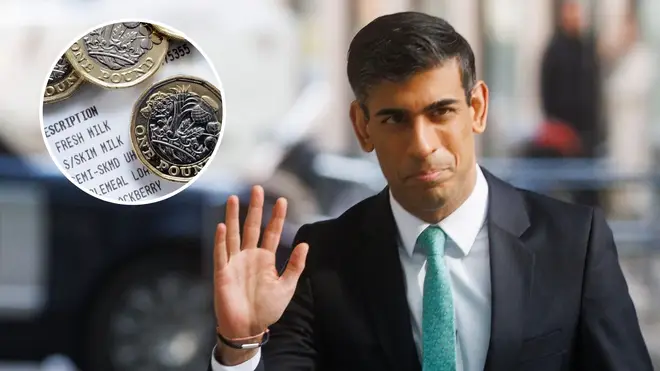
Iain Dale 7pm - 10pm
23 March 2022, 07:09 | Updated: 23 March 2022, 08:44

Inflation rose by 6.2% in the 12 months to February, the highest level for 30 years.
The rate of Consumer Price Index inflation increased from 5.5% in January, the Office for National Statistics [ONS] said.
The higher-than-expected figures will do nothing to alleviate fears of Britain’s cost-of-living crisis. The rise of 6.2% is the highest level since the 7.1% seen in March 1992.
It was driven by increases in the prices of food, clothing, footwear and other products and services. Inflation rose across 10 of the 12 categories used for the index, the ONS said. The remaining two were education and communication.
Read more: Pressure mounts on Rishi ahead of 'crucial' spring statement as cost of living soars
Read more: 'Catastrophic' sanctions against Russia will hit poorer households in UK, MPs warn
The news comes ahead of Chancellor Rishi Sunak's spring statement, in which he is expected to lay out more help for households facing tough times in the cost of living squeeze.
Grant Fitzner, chief economist at the ONS, said: "Inflation rose steeply in February as prices increased for a wide range of goods and services, for products as diverse as food to toys and games.

Tory MP says Rishi will get the balance right in the Spring Statement
"Clothing and footwear saw a return to traditional February price rises after last year's falls when many shops were closed.
"Furniture and flooring also contributed to the rise in inflation as prices started to recover following new year sales.
"The price of goods leaving UK factories has also been rising substantially and is now at its highest rate for 14 years."
Read more: Govt taxing 'wrong people' and those with 'broadest shoulders' should pay up, Rayner says
Mr Sunak is expected to tell MPs on Wednesday that having a strong economy will be vital to combat Russian aggression against Ukraine.
It follows the raising the energy price cap and the hiking of interest rates last week by the Bank of England as the Ukraine war exacerbates the crisis.
Ofgem, the energy regulator, has allowed the price cap to rise by 54% and another increase - possibly as high as 50% - is expected in October because of the knock-on effect of the Ukraine invasion on gas prices.
While it warned of inflation peaking at about 8% in April, and possibly getting to double digits if energy prices keep rocketing up because of Russia's attack on Ukraine, the Bank of England took interest rates to 0.75% from 0.5%.

Angela Rayner pressed on a wealth tax
One of the most visible signs of inflation recently were the prices at the pumps.
The ONS found average prices hit a record of 147.6p a litre in February. It was 120.2p a year before.
Diesel prices were, on average, also at their highest ever recorded level – 151.7p a litre.
Food and non-alcoholic drinks had 5.1% inflation, the highest level since September 2011.
Clothing, furniture and household equipment also drove inflation, after the coronavirus lockdowns dampening prices last year.
Meanwhile, the Retail Prices Index, which also measures inflation, was at 8.2%, the highest level since March 1991.
The CPIH (Consumer Prices Index with Housing), the ONS's preferred way of measuring inflation, which takes into account owner-occupiers' housing costs, was 5.5% in February, compared to 4.9% in January.